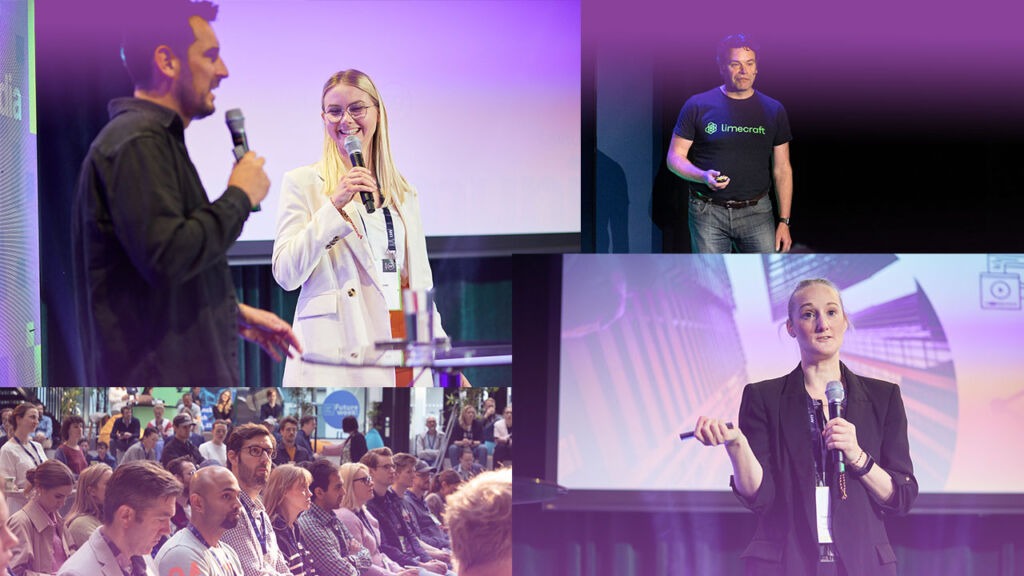What better source to hear about STADIEM’s importance than the very beneficiaries of its programme? In this second half of a two-part article, we sit down with Open Call 2 Pilot phase scale-ups Druid Learning, BotTalk and Limecraft to get also their specific perspective on the STADIEM journey to empower their respective innovative media solutions.

Let’s start from the basics: what’s your start-up/scale-up’s solution, in a nutshell?
Limecraft: In general, Limecraft offers advanced production automation solutions for media professionals, fuelled by AI and metadata handling. In one particular area, Limecraft has a significant competitive advantage and this is subtitling. As part of their digital first strategy, all broadcasters commit to provide same language subtitles on all their content pieces, also short form and other forms of non-broadcast content. Non-broadcast content is more difficult to handle, not because of the size but because of the sheer number of items and the assumed short turnaround time. By automating the process of creating subtitles, and by plugging this into the day-to-day workflow of journalists and editors, we have made it super easy to live up to their expectations.
BotTalk: BotTalk is a text-to-speech SaaS platform that creates an audio version of each web page and develops advanced AI voices. Our solution achieves a click-through rate of 10% and a listen-through rate of 75%, which increases a reader’s dwell time by 2.5 minutes. In the field of AI Voice Cloning we focus on a variety of European languages as well as dialects and enable every publisher to create their own branded voice.
Druid Learning: We future proof a company’s content database and allow companies to truly embrace whatever digital future they envision. We do this by breaking down content files and automatically assigning a unified layer of metadata to all content assets increasing the discoverability of content and eliminating the cost of large IT integrations.
What would be the impact of your STADIEM pilot on the corporate/sector level?
Limecraft: Evidence shows that all broadcasters typically create an average of 500 hours of aggregated short form content. Given that manual subtitling takes +/- 10 times the length of the clip, the latent cost for a broadcaster would be up to 100k per month. By using Limecraft, the corporate can deliver subtitles of at least the same quality, at a fraction of the cost, and within seconds after editing. As a spill over, the items’ SEO is drastically improved.
BotTalk: In collaboration with BotTalk, publishers take their first steps toward digital transformation and leverage the emerging opportunities of artificial intelligence. Our deep insights into the media landscape and a platform carefully tailored to publishers’ needs enable us to address each client’s distinct challenges. We address the three issues facing every publisher: low user engagement, canceled subscriptions, or diminishing advertising revenues. By leveraging our Custom Voices framework, we offer a significant advantage. Companies can create customized, branded voices: a strategic move that underpins the competitive advantage of our solution. This uniqueness requires more than a generic text-to-speech implementation from competitors to keep up. BotTalk offers a new way to distribute existing content by using synthesized voices to connect with users emotionally. The custom voice reinforces a publisher’s branding and promotes trust with minimal effort and cost. During the pilot phase, corporate was able to test the performance of the custom voice and could gain valuable insights regarding user acceptance of AI voices.
Druid Learning: In the pilot phase, we worked with a large Irish publisher to automatically implement a layer of metadata onto their popular book series known as “Lets Discover”. All files were in PDF, IDML and xml format. We automatically itemised all the content files, applied a unified layer of metadata onto all the assets and transformed their flat content files into a dynamic data set. On completion of the tasks, we had saved our client over 150k in integration costs and provided them with the ability to rapidly develop their own IT applications using their dynamic content. Druid Learning also provided over 90k in resource savings by automating manual filing and organisation processes.
What is the main advantage of STADIEM’s programme to you?
Limecraft: The one key benefit of having participated in the STADIEM programme is the level of exposure we got with real end users. Introducing automation involves change, change management requires a hands-on approach and multiple touch points. STADIEM enabled us to execute, whereas the risk of not pushing to the actual results would have been much more substantial.
BotTalk: The STADIEM programme afforded us the unparalleled opportunity to expand into the European landscape. Notably, the STADIEM network served as an invaluable conduit for cultivating B2B leads, significantly augmenting our business prospects. Critical to our progress, funding proved indispensable in realizing our ambition to develop proprietary voices, which wouldn’t be possible without it.
Druid Learning: Without STADIEM we would not have been able to grow or scale our product as rapidly as we have done. When Druid Learning began our journey we were a start-up with a number of trial clients, thanks to the program we have moved from being a start-up to being a scale-up, with a competitive commercial product, that is actively working with enterprise clients.
Come and meet our scale-ups in real life in Amsterdam, at IBC 2023, from September 15 to 18 – For any updates on STADIEM, make sure to follow us on Twitter/X and LinkedIn!

